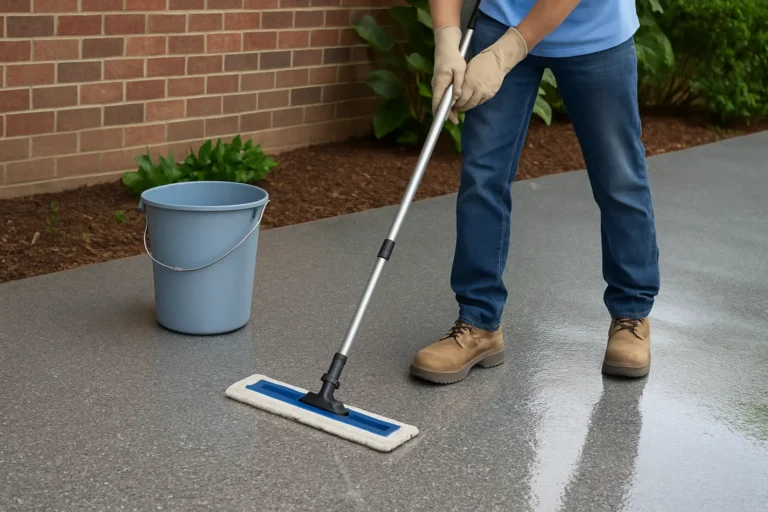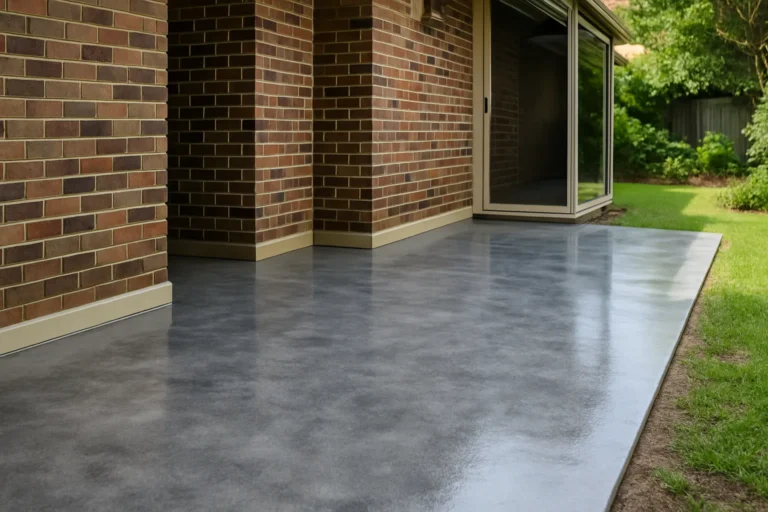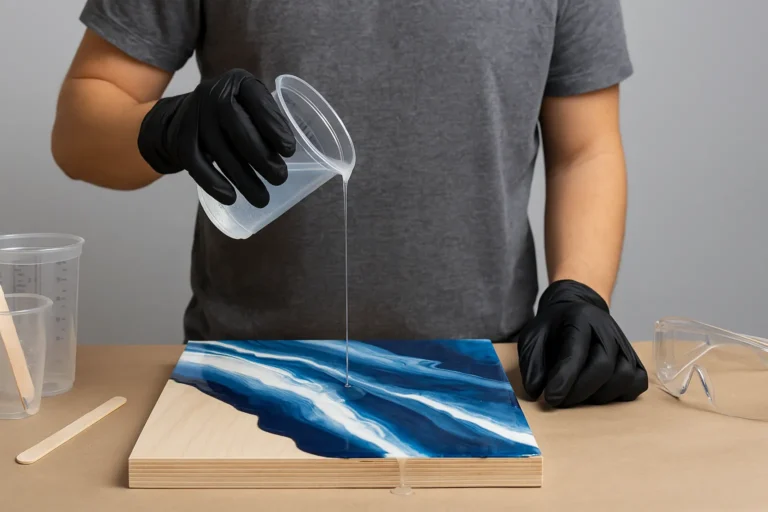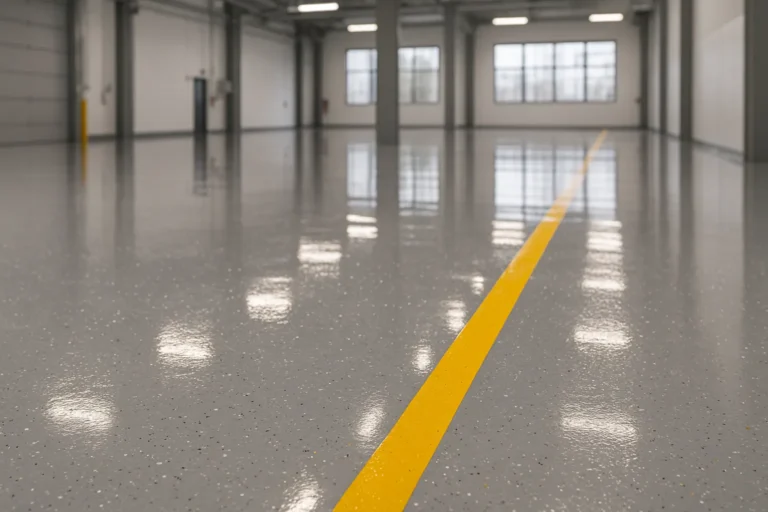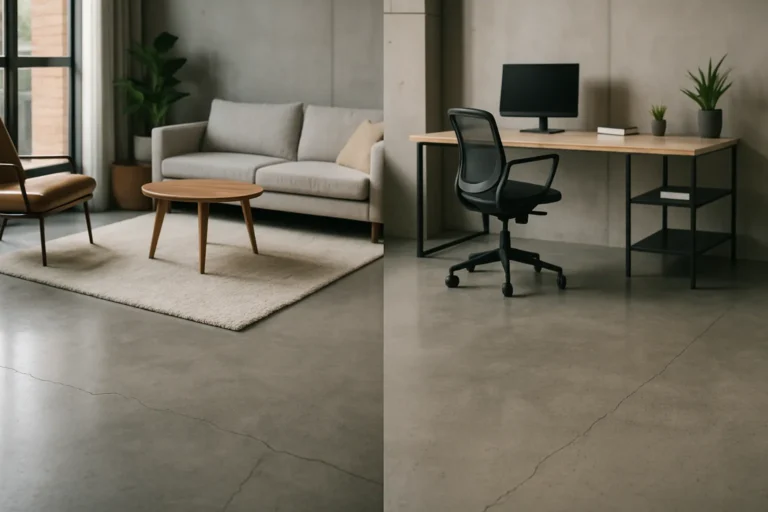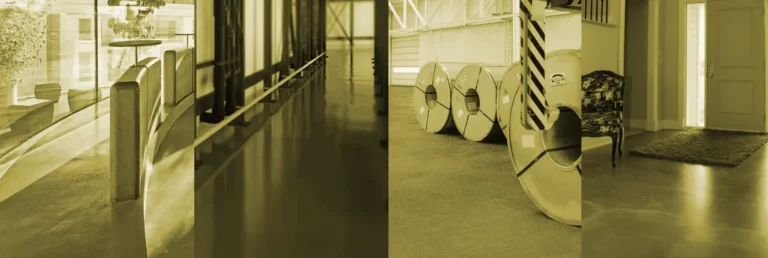Epoxy flooring has become a popular choice for retail stores seeking high-durability flooring solutions. This type of flooring not only enhances the aesthetic appeal of commercial spaces but also offers practical benefits that cater to the demands of high-traffic environments. In this article, we will explore the various aspects of epoxy flooring, its benefits, types, and how it integrates into commercial interior design.
Benefits of Epoxy Flooring in Retail Environments
Enhanced Durability for High-Traffic Areas
Epoxy flooring is renowned for its exceptional durability, making it ideal for retail environments that experience heavy foot traffic. The robust nature of epoxy ensures that it can withstand the constant wear and tear of daily operations without showing signs of damage. This durability translates to a longer lifespan, reducing the need for frequent replacements and repairs.
- Resistant to scratches and scuffs
- Withstands heavy loads and impacts
- Long-lasting performance
Easy Maintenance and Cleaning
One of the standout features of epoxy flooring is its ease of maintenance. Retail store owners can appreciate the low upkeep requirements, which save both time and money. The seamless surface of epoxy floors prevents dirt and debris from accumulating, making cleaning a breeze.
- Simple to sweep and mop
- Stain-resistant surface
- Reduces cleaning time and costs
Aesthetic Appeal and Customization Options
Epoxy flooring offers a wide range of aesthetic possibilities, allowing retail stores to customize their floors to match their brand identity. From vibrant colors to intricate patterns, epoxy can be tailored to create a unique and visually appealing environment.
- Available in various colors and finishes
- Can incorporate logos and designs
- Enhances the overall store ambiance
Types of Epoxy Flooring Systems for Retail Spaces
Self-Leveling Epoxy Flooring
Self-leveling epoxy flooring is a popular choice for retail spaces due to its smooth and even finish. This type of flooring is applied over existing surfaces, creating a seamless and polished look that enhances the overall appearance of the store.
- Ideal for uneven surfaces
- Provides a sleek and modern finish
- Quick and efficient installation
Decorative Epoxy Flake Flooring
Decorative epoxy flake flooring adds a touch of creativity to retail spaces. By incorporating colored flakes into the epoxy, this flooring option creates a textured and visually interesting surface that can complement any store design.
- Offers a unique and eye-catching appearance
- Customizable with different flake sizes and colors
- Provides slip resistance
Anti-Slip Epoxy Flooring for Safety
Safety is a top priority in retail environments, and anti-slip epoxy flooring addresses this concern effectively. This type of flooring is designed to reduce the risk of slips and falls, ensuring a safe shopping experience for customers.
- Increases traction and grip
- Suitable for areas prone to moisture
- Enhances safety for both customers and staff
Designing Retail Interiors with Epoxy Flooring
Color Psychology in Retail Design
Color plays a significant role in influencing customer behavior, and epoxy flooring can be used strategically to enhance the shopping experience. By selecting colors that align with the store’s branding and target audience, retailers can create an inviting and engaging atmosphere.
- Warm colors can evoke excitement and energy
- Cool colors promote calmness and relaxation
- Color choices can impact purchasing decisions
Incorporating Brand Elements into Flooring
Epoxy flooring offers the flexibility to incorporate brand elements directly into the floor design. This customization allows retailers to reinforce their brand identity and create a cohesive look throughout the store.
- Logos and slogans can be embedded in the floor
- Consistent branding enhances recognition
- Creates a memorable shopping experience
Creating Zones and Pathways with Epoxy
Retail stores can utilize epoxy flooring to define different zones and pathways within the space. This not only improves the flow of foot traffic but also guides customers through the store in a strategic manner.
- Distinct zones for product categories
- Pathways lead customers to key areas
- Enhances the overall shopping experience
High-Durability Flooring Solutions for Commercial Spaces
Chemical and Stain Resistance Properties
Epoxy flooring is highly resistant to chemicals and stains, making it an excellent choice for retail environments where spills and accidents are common. This resistance ensures that the floor maintains its appearance and functionality over time.
- Protects against chemical spills
- Resists staining from various substances
- Maintains a clean and professional look
Impact and Abrasion Resistance
Retail stores often experience heavy foot traffic and the movement of equipment, which can lead to wear and tear. Epoxy flooring’s impact and abrasion resistance make it a durable solution that can withstand these challenges.
- Withstands heavy foot traffic
- Resistant to scratches and dents
- Ideal for high-traffic areas
Long-Term Cost-Effectiveness
While the initial installation cost of epoxy flooring may be higher than other options, its long-term cost-effectiveness makes it a wise investment. The durability and low maintenance requirements result in significant savings over time.
- Reduces the need for frequent replacements
- Lowers maintenance and repair costs
- Offers a high return on investment
Commercial Interior Design Trends Utilizing Epoxy Flooring
Metallic Epoxy for Modern Aesthetics
Metallic epoxy flooring is a popular trend in commercial interior design, offering a sleek and modern look that enhances the overall aesthetic of retail spaces. The reflective surface creates a sense of luxury and sophistication.
- Creates a high-end appearance
- Available in various metallic finishes
- Enhances lighting and ambiance
Seamless Transitions Between Different Areas
Epoxy flooring allows for seamless transitions between different areas within a retail store. This creates a cohesive and unified look that enhances the overall design and flow of the space.
- Eliminates the need for transition strips
- Provides a continuous and smooth surface
- Enhances the visual appeal of the store
Integrating Lighting Elements with Epoxy Floors
Lighting plays a crucial role in retail design, and epoxy flooring can be integrated with lighting elements to create a dynamic and engaging environment. This combination enhances the overall shopping experience and highlights key areas of the store.
- LED lights can be embedded in the floor
- Enhances product displays and focal points
- Creates a unique and memorable atmosphere
Installation Process of Epoxy Flooring in Retail Stores
Surface Preparation Techniques
Proper surface preparation is essential for a successful epoxy flooring installation. This involves cleaning and repairing the existing surface to ensure optimal adhesion and a smooth finish.
- Thorough cleaning and degreasing
- Repairing cracks and imperfections
- Ensures a strong bond with the substrate
Application Methods and Curing Time
The application of epoxy flooring involves several steps, including mixing, pouring, and spreading the epoxy. The curing time is crucial to ensure the floor reaches its full strength and durability.
- Mixing and applying the epoxy evenly
- Allowing sufficient curing time
- Ensures a durable and long-lasting finish
Minimizing Disruption to Business Operations
Retail stores cannot afford prolonged downtime during renovations. The installation process of epoxy flooring is designed to minimize disruption to business operations, allowing stores to resume normal activities quickly.
- Efficient installation techniques
- Quick curing times
- Reduces downtime and loss of revenue
Maintenance and Care for Epoxy Floors in Retail Environments
Daily Cleaning Procedures
Regular cleaning is essential to maintain the appearance and functionality of epoxy floors. Simple daily cleaning procedures can keep the floor looking pristine and extend its lifespan.
- Sweeping to remove dirt and debris
- Mopping with a mild detergent
- Prevents buildup of grime and stains
Periodic Deep Cleaning and Resealing
In addition to daily cleaning, periodic deep cleaning and resealing are necessary to maintain the integrity of epoxy floors. This process helps to restore the floor’s shine and protect it from wear and tear.
- Deep cleaning with specialized equipment
- Resealing to enhance durability
- Extends the life of the flooring
Addressing Common Issues and Repairs
Despite its durability, epoxy flooring may encounter issues such as scratches or chips. Addressing these common issues promptly can prevent further damage and maintain the floor’s appearance.
- Repairing minor scratches and chips
- Addressing discoloration or fading
- Ensures a consistent and professional look
Case Studies Showcasing Successful Epoxy Flooring in Retail Stores
Fashion Boutique Transformation
A fashion boutique transformed its interior with epoxy flooring, creating a chic and modern atmosphere that attracted more customers. The seamless design and vibrant colors enhanced the store’s aesthetic appeal.
- Increased customer foot traffic
- Enhanced brand image and identity
- Improved overall shopping experience
Grocery Store Durability Success
A grocery store implemented epoxy flooring to address durability concerns in high-traffic areas. The flooring’s resistance to spills and stains ensured a clean and safe environment for shoppers.
- Reduced maintenance costs
- Improved safety and hygiene
- Enhanced customer satisfaction
Electronics Retailer’s Anti-Static Solution
An electronics retailer opted for anti-static epoxy flooring to protect sensitive equipment and enhance safety. The flooring’s anti-static properties reduced the risk of damage and improved the store’s operational efficiency.
- Protected electronic devices
- Reduced static-related incidents
- Enhanced store safety and performance
Environmental Benefits of Epoxy Flooring in Commercial Spaces
Low VOC Options for Improved Air Quality
Epoxy flooring is available in low VOC (volatile organic compounds) options, which contribute to improved indoor air quality. This is particularly important in retail environments where customers and staff spend extended periods.
- Reduces harmful emissions
- Promotes a healthier indoor environment
- Aligns with sustainability goals
Energy Efficiency through Reflective Surfaces
The reflective properties of epoxy flooring can enhance energy efficiency in retail spaces. By reflecting natural and artificial light, epoxy floors can reduce the need for additional lighting, leading to energy savings.
- Enhances natural lighting
- Reduces energy consumption
- Lowers utility costs
Longevity Reducing Material Waste
The long lifespan of epoxy flooring contributes to environmental sustainability by reducing material waste. Fewer replacements mean less waste generated, aligning with eco-friendly practices. Epoxy flooring durability Durable aesthetic flooring looks great and lasts a long time It can handle lots of foot traffic while keeping your home beautiful
Collaborative epoxy floors are special floors made by teams working together to create strong and shiny surfaces Epoxy flooring customization lets you choose colors and patterns for your floor You can make your floor look unique with
Metallic epoxy flooring is a shiny and colorful type of floor coating that looks like swirling metal It makes regular floors look fancy and is very strong and easy to clean Resilient museum cafeteria epoxy is a super strong floor coating that can handle lots of people walking on it and spills from food and drinks It helps keep museum cafeterias clean and looking nice for a long time
Resilient industrial epoxies are super strong glues used in factories and construction They stick things together really well and can handle tough conditions without breaking Flooring UAE comparison helps people find the best floors for their homes by looking at different types and prices It makes choosing floors easier by showing many options side by side
Epoxy polyaspartic comparison Epoxy and polyaspartic are both floor coatings but polyaspartic dries faster and is more flexible while epoxy is thicker and cheaper
- Durable and long-lasting
- Reduces landfill waste
- Supports sustainable building practices
Comparing Epoxy Flooring to Other Commercial Flooring Options
Epoxy vs. Polished Concrete
Epoxy flooring and polished concrete are both popular choices for commercial spaces, but they offer different benefits. Epoxy provides a seamless and customizable surface, while polished concrete offers a more industrial look.
- Epoxy offers more design flexibility
- Polished concrete is more cost-effective
- Both options are durable and low maintenance
Epoxy vs. Vinyl Composition Tile (VCT)
When comparing epoxy flooring to vinyl composition tile (VCT), epoxy stands out for its durability and seamless finish. VCT may require more maintenance and is prone to wear and tear over time.
- Epoxy is more durable and long-lasting
- VCT is more affordable initially
- Epoxy offers a seamless and modern look
Epoxy vs. Ceramic Tile
Epoxy flooring and ceramic tile each have their advantages. Epoxy offers a seamless and customizable surface, while ceramic tile provides a classic and traditional look.
- Epoxy is easier to maintain
- Ceramic tile offers a wide range of designs
- Both options are suitable for high-traffic areas
FAQs
How long does epoxy flooring last in a retail store?
Epoxy flooring can last for many years in a retail store, depending on various factors. Proper installation, maintenance, and the level of foot traffic all play a role in determining the lifespan of epoxy flooring. On average, epoxy floors can last between 5 to 10 years in high-traffic retail environments.
Can epoxy flooring be installed over existing retail store floors?
Yes, epoxy flooring can be installed over existing retail store floors, provided the substrate is compatible. Proper preparation is essential to ensure a successful installation, which may involve cleaning, repairing, and priming the existing surface. This process ensures optimal adhesion and a smooth finish.
What are the cost considerations for epoxy flooring in commercial interior design?
The cost of epoxy flooring in commercial interior design includes initial installation costs and long-term value. While the upfront cost may be higher than other flooring options, the durability and low maintenance requirements of epoxy flooring offer significant savings over time. Factors such as the size of the area and customization options can also influence pricing.
How does epoxy flooring contribute to retail store branding?
Epoxy flooring contributes to retail store branding by offering customization options for brand integration. Retailers can incorporate logos, colors, and designs directly into the floor, creating a cohesive and memorable shopping experience. This enhances customer perception and reinforces brand identity.
Are there any limitations to using epoxy flooring in retail stores?
While epoxy flooring offers numerous benefits, there are some limitations to consider. Moisture sensitivity is a concern, as epoxy may not adhere well to damp surfaces. Additionally, epoxy flooring can be prone to yellowing when exposed to UV light, which may affect its appearance over time.
